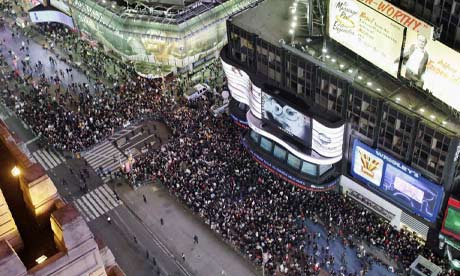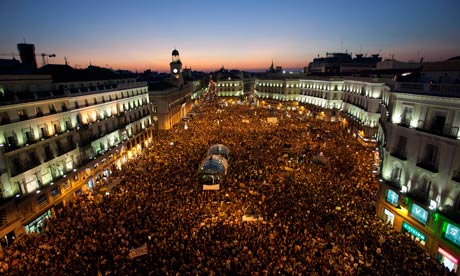NEWS UPDATES PICTOGRAPHS, VIDEOS & CURRENT AFFAIRS. خبریں تصاویر ویڈیوز حالات حاضرہ
Sunday, October 16, 2011
Journalist Latif Zafar with his two fried was coming to Bhawalnagar from Gijaani
Adda when a speeding truck rammed into their motorcycle near Chak Dhabaan.
The three fell on the ground and received severe injuries. Latif Zafar and Ghulam Mohiuddin died on the
spot while Muhammad Zaman was shifted to district hospital in critical condition. The truck driver managed to flee from the spot.
Adda when a speeding truck rammed into their motorcycle near Chak Dhabaan.
The three fell on the ground and received severe injuries. Latif Zafar and Ghulam Mohiuddin died on the
spot while Muhammad Zaman was shifted to district hospital in critical condition. The truck driver managed to flee from the spot.
Occupy' anti-capitalism protests spread around the world
Occupy London protest: on the steps of St Paul's cathedral. Source: guardian.co.ukLink to this video
 Occupy Wall Street protesters take part in a demonstration at Times Square in New York. Photograph: Eduardo Munoz/Reuters
Occupy Wall Street protesters take part in a demonstration at Times Square in New York. Photograph: Eduardo Munoz/Reuters
 Tens of thousands of people take a part in a demonstration in Puerta del Sol square in Madrid on Saturday, part of the global movement against corporate greed. Photograph: Arturo Rodriguez/AP
Tens of thousands of people take a part in a demonstration in Puerta del Sol square in Madrid on Saturday, part of the global movement against corporate greed. Photograph: Arturo Rodriguez/AP
Occupy London protest: on the steps of St Paul's cathedral. Source: guardian.co.ukLink to this video
Protests inspired by the Occupy Wall Street movement in New York and the "Indignants" in Spain have spread to cities around the world.
Tens of thousands went on the march in New York, London, Frankfurt, Madrid, Rome, Sydney and Hong Kong as organisers aimed to "initiate global change" against capitalism and austerity measures.
There were extraordinary scenes in New York where at least 10,000 protesters took their message from the outpost of Zuccotti Park into the heart of the city, thronging into Times Square.
Only 36 hours earlier, police were preparing to evict the protest from Zuccotti Park. On Saturday they escorted thousands of marchers all day as they made their way uptown through Manhattan, and looked on as they held a rally at a New York landmark.
 Occupy Wall Street protesters take part in a demonstration at Times Square in New York. Photograph: Eduardo Munoz/Reuters
Occupy Wall Street protesters take part in a demonstration at Times Square in New York. Photograph: Eduardo Munoz/Reuters
Dave Bonan, who was at Occupy Wall Street on the first day of the protest a month ago, said it was "a little surreal" that the protest had spread. "I didn't expect it to last more than 15 minutes," he said. "The fact it lasted more than a day inspired people all over the world to capitalise – no pun intended – on our success."
In Madrid, tens of thousands of people take a part in a demonstration in Puerta del Sol square in Madrid, home of the "Indignants" movement, which has been building through the summer as Spain's economy faltered.
 Tens of thousands of people take a part in a demonstration in Puerta del Sol square in Madrid on Saturday, part of the global movement against corporate greed. Photograph: Arturo Rodriguez/AP
Tens of thousands of people take a part in a demonstration in Puerta del Sol square in Madrid on Saturday, part of the global movement against corporate greed. Photograph: Arturo Rodriguez/AP
In London, dusk fell on more than 2,000 protesters assembled in front of St Paul's Cathedral in London, earlier addressed by the WikiLeaks founder Julian Assange.
There was civil unrest in Rome, where police turned teargas and water cannon on the crowds. Smoke hung over Rome as a small group broke away from the main demonstration and smashed windows, set cars on fire and assaulted television news crews. Others burned Italian and EU flags. "People of Europe: Rise Up!" read one banner in Rome. Fights broke out and bottles were thrown between demonstrators as some tried to stop the violence.
In Germany, about 4,000 people marched through the streets of Berlin, with banners calling for an end to capitalism. Some scuffled with police as they tried to get near parliamentary buildings. In Frankfurt, continental Europe's financial capital, some 5,000 people protested in front of the European Central Bank.
In the Bosnian city of Sarajevo, marchers carried pictures of Che Guevara and old communist flags that read "Death to capitalism, freedom to the people".
Another 500 people gathered at a peaceful rally in Stockholm, holding up red flags and banners that read "We are the 99%" – a reference to the richest 1% of the world's population who control its assets while billions live in poverty.
"There are those who say the system is broke. It's not," trade union activist Bilbo Goransson shouted into a megaphone. "That's how it was built. It is there to make rich people richer."
Asian nations, where the fallout from the banking crisis has been less severe, saw less well attended protests – 100 turned out in the Philippines.
A group of 100 prominent authors including Salman Rushdie, Neil Gaiman and Pulitzer prize-winning novelists Jennifer Egan and Michael Cunningham signed an online petition declaring their support for "Occupy Wall Street and the Occupy movement around the world".
Police in London made seven arrests and contained the crowd near St Paul's. Assange made a dramatic appearance, bursting through the police lines just after 2.30pm, accompanied by scores of supporters.
To clapping and some booing, he climbed the cathedral steps to condemn "greed" and "corruption". In particular he attacked the City of London, accusing its financiers of money laundering and tax avoidance. "The banking system in London is the recipient of corrupt money," he said, adding that WikiLeaks would launch a campaign against financial institutions.
Assange is on bail as he fights extradition to Sweden, where he is wanted for questioning over claims of rape and sexual molestation made by two women.
Police in New York said they made 70 arrests. These were mostly at two flashpoints: 42 were detained near Times Square when attempts to disperse a crowd led to confusion; 24 Citibank customers who attempted to close their accounts in protest were led away for trespass after they opposed an order by the branch manager for them to leave.
Barbara Quist, 67, was pushed around by police in Times Square. Quist, who used to work in the pharmaceutical industry but described herself as unemployed, said the treatment would not put her off further action. "I'm just another person that's just been run over by capitalism and greed."
Ethan McGarry, 18, who had travelled to New York from Boston for the day, said it was "fantastic" how the occupy movement had spread. "People identify with us, then hey will find reasons in their own community for action."
Lauren Zygmont had travelled from the Occupy Denver protest to New York a week ago ago. "Borders don't matter at all," she said. "Were all human beings, were all in this together. This is a global movement."
Friday, October 14, 2011
Monday, October 10, 2011

Mumbai: Acclaimed ghazal singer Jagjit Singh died on Monday in Mumbai. The 70-year old was admitted to Mumbai's Lilavati hospital after he suffered brain hemorrhage last month. He underwent two surgeries and was on life support.
Born on February 8, 1941, 'the ghazal king' was a singer, composer, activist and entrepreneur. He has sung in several languages including Hindi, Urdu, Punjabi and Nepali. Jagjit Singh entered the music circuit at a time which was primarily dominated by Pakistani ghazal singers, and Indian singers were considered relatively lesser authentic than their Pakistani counterparts.
Unlike other ghazal singers, Singh did not hesitate in lending his voice for films. His silky voice ruled during early 80's in films like Prem Geet, Saath Saath and Arth. However, his major work is spread over more than 60 filmy and non filmy albums.
Jagjit Singh was also known for modern approach and infusion of technology in the traditional art of ghazal singing. Singh was the first Indian music director to use the technique of multi-track recording for his album 'Beyond Time'.
Recipient of Padma Bhushan award, Jagjit Singh was the man behind making the ghazal genre available and understandable to all. Prior to Singh, ghazal singing was considered as an elite art, which was difficult for the common mass to understand due to high class Urdu and Persian.
Jagjit Singh broke this myth by coming up with songs such as 'Kaagaz ki kashti', 'Chaak jigar ke', 'Kal chadhanvi ki raat thi', and 'Shaam se aankh me name si hai'. He mixed the words of legends like Ghalib, Qateel Shifai, Firaq Gorakhpuri, Nida Fazli and Sudarshan Faakir with melodious indigenous tunes and achieved a state where nothing came in between him and his listeners.
Later when television started showcasing music videos, he was among one of the prominent members of the music fraternity to avail the facility. He again came up with brilliant albums such as 'Face to Face', 'Marasim', 'Aaeena', and 'Dil Kahin Hosh Kahin'.
Jagjit Singh had also given his voice for ex-prime minister Atal Bihari Bajpayee poems in the albums 'Nayi Disha' and 'Samvedna'.
Jagjit Singh is survived by his wife Chitra Singh, with whom he had produced several record breaking albums. Their only son Vivek Singh had died in a road accident in 1990
Subscribe to:
Posts (Atom)



